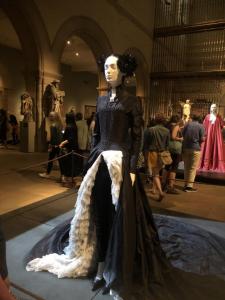Last summer at a conference I was randomly assigned a roommate who turned into a new friend. Stacey is a pastor in upstate New York, but she hails from Minnesota. You can tell she’s from Minnesota because, well, of the way she talks. She also talks about hockey. A lot. This week on her Facebook page she listed 25 things Minnesotans do that other people find weird—including but not limited to: going outside in blizzards, using tater tots as a staple in any hot dish (something we apparently call a casserole), and using their beer coozies not to keep their beer cool, but to insulate it to make sure it doesn’t freeze. Stacey commented with her list: “You can take the girl out of Minnesota, but you can’t take Minnesota out of the girl!”
She’s right. Our context shapes us and informs our lives in ways we don’t often consider. Today we continue our conversation about Identity, Values, and Mission—things that drive us around here at Calvary Baptist Church on the corner of 8th and H streets in downtown Washington, DC—by talking about PLACE.
Last week, Brent Walker from the Baptist Joint Committee reminded all of you about perspective—legacy. Apparently he did it very well, as I got reports of many visitors, awesome worship, and a new Calvary member. (Maybe I should travel more often!) Legacy: this church has always been on the leading edge of social change, struggling through our call to be a community that asks hard questions and takes the challenge of following Jesus seriously. We value that legacy because looking back helps us to take steps into a future we cannot see, a future that is sometimes filled with fear. Today I want to think a bit about how the value of place informs who we are.
Guiding our conversation today is a passage from the gospel of Matthew in which Jesus invites the first disciples to come and follow him. Remember, in the weeks after Epiphany the lectionary gospel texts tell about Jesus and his disciples as they tried to figure out what they were doing, what life as a disciple meant. As we examine the values that inform our identity and mission as a church, it’s probably good that we do the same, since we say we want to be disciples of Jesus, too.
So, quick review: Jesus got baptized in the Jordan River. Then he went into the wilderness for 40 days, where he was tempted by the devil and where he did some serious soul searching about who he was and what he was meant to do. After he came back to get things going, he heard the news that his cousin John had been arrested by the Roman governor. Matthew tells us that Jesus started going around saying the same exact thing John had been saying (the thing that got him arrested!), and began to look for folks who would join him on his mission.
Now, if I were Jesus (which I clearly am not), and I had taken on the work of challenging oppressive and unjust government and religious structures, and I needed some people who would help me, people who would be on my team (so to speak), I might look for: a good social media person to do messaging, someone super connected in the halls of power to get me an “in” I wouldn’t have otherwise, a couple of folks who specialized in community organizing, maybe some educated think tank-like folks to help with strategy. Right?
But as we read in Matthew’s gospel this morning, that is not the approach Jesus took. Instead, Jesus went home, to the region around Nazareth  where he grew up. In Capernaum, a little village on the Sea of Galilee, he walked along the water and invited some of the folks who were fishing to join the team. Capernaum was then a village of about a thousand people, populated not by highly connected, powerful folk, but instead by fishers and farmers, uneducated people who knew the water but certainly did not know how to read and definitely not how to navigate the halls of power.
where he grew up. In Capernaum, a little village on the Sea of Galilee, he walked along the water and invited some of the folks who were fishing to join the team. Capernaum was then a village of about a thousand people, populated not by highly connected, powerful folk, but instead by fishers and farmers, uneducated people who knew the water but certainly did not know how to read and definitely not how to navigate the halls of power.
To do what he was called to do—a world-changing, risky endeavor—Jesus went home to a place that had formed him, to a context oppressed by Roman rule and people unable to access God through the hierarchy of the temple in Jerusalem. It was this place that had formed him. It was these people who needed him to speak out. It was this context from which he would know the steps he needed to take to change the world.
In June of last year I asked twelve Calvary folk to give me 24 hours. They met me away from here, out of the city, and I listened while they talked with a facilitator about this community of faith: Who are we? What’s important to us? How do we know what we’re called to do and be? One of the values that I heard clearly was the value of place.
Here we are on the corner of 8th and H streets, an old and massive building, a sacred space in the middle of one of the most powerful and unsacred cities in the world. Over a hundred and fifty years ago, a new little church thought it would be a good idea to build a sanctuary here on the edges of a growing national capital city, and now here we are right in the middle. Next to a Metro stop. And I can say without hesitation: our PLACE, our context, is part of our mission and calling as a community.
If we were to decide today that we wanted to start a church in Washington, DC, a community formed and guided by the gospel of Jesus Christ, a community like ours: small, diverse, prophetic, loving, it’s fairly likely we would not get together and decide to buy almost and entire block of land in downtown DC and build a huge sanctuary with a large organ and a brand new massive heating and air conditioning system that had to be installed using a crane.
I’m pretty sure we would not.
But here we are, stewards of this amazing sacred space on a large piece of property in the middle of Washington, DC. And it is not a burden; it is not a liability; is it not an albatross around our necks keeping us from being who we are.
It’s a gift.
It’s a gift and a holy calling, to be stewards of this space where being the church looks different at different times over hundreds of years of history, but where place and context give us courage to nurture creative and beautiful ways in which God’s grace can meet us where we are and where we can be agents of change in a world so desperate for hope that things can be different. Our PLACE helps us to know who we are and what we’re called to do.
Tom Mayes is Deputy General Counsel for the National Trust for Historic Preservation. He recently wrote a series of articles called, “Why Do Old Places Matter?” in which he says that old places gift us with memory, continuity, and identity. Old places, places like this, help us remember: the ideals to which we aspire, the mistakes we’ve made over the years, the successes we’ve had. They give us a sense of continuity, a rootedness and anchor in the past, that—rather than holding us in an institutional vise—gives us courage and perspective to move into the future. And old places, places like this one, shed light on our identity as a community. We, the people gathered here today, are certainly not the same as the group that gathered to worship in these pews 150 years ago. But it’s with the context of place—this place—that we live boldly into who God is calling us to be here and now.
Being the church here on the corner of 8th and H NW in Washington, DC has taken different forms over the years. This building, this place, has been used as a canteen for soldiers during World War I and World War II. It has housed a single women’s Sunday School class of over 1500 members. It has been the site of respite for many visiting the city to advocate for change. Right beneath us the very first shelter for homeless women in the city of Washington was started. At-risk neighborhood youth used our gym as a safe place to be off the streets after school. We fed the homeless population for many years out of our downstairs kitchen. Now our building is a place where people who have never been heard before learn to tell their stories with the help of the Washington Theatre Lab, where kids who would never get an opportunity otherwise learn culinary arts in our kitchen, where KidPower plans gardens all over our city to teach city kids how to grow and eat vegetables, where harried workers in our big city can come for a lunch time opportunity to hear beautiful music, where recovery groups meet almost daily, where hundreds of people show up to hear Nadia Bolz-Weber talk about compelling Christian faith, and where we—you and me—gather together every Sunday morning to remember who we are and who God is through beautiful worship, healthy engagement, and the love of a familiar community.
This is our PLACE. Our mission and the way it expresses itself is ever changing at the impulse and direction of God’s Spirit. But we understand who we are right now because of the gift of place, of this place.
Think about this place. Just take a moment. You come here week in and week out to meet God, because there’s something holy—for you—about this place. Join the crowd. Just last Sunday, we had a visitor who noted on her visitor card that she had been a member of this church over 40 years ago, and it was her first time back in the sanctuary since then. I wrote an email to thank her for coming and she replied: “Dear Amy, It was a wonderful homecoming! Wonderful, kind, people at Calvary, and I’m so impressed with the renovations! My family joined I think in 1962 and so my nursery, preschool, and elementary Sunday school was at Calvary. Dr. Cranford baptized my brother and me just before he retired in the early 1970s, [and then my family moved]. [This place] has wonderful memories for me and my family. Visiting made me so proud to have been a part of the Calvary community!”
This place, it is our gift. And we’re called as a community to see and understand that gift as a tool to help us learn and know in deeper and better ways, what it means to follow Jesus.
May it be so. Amen.











